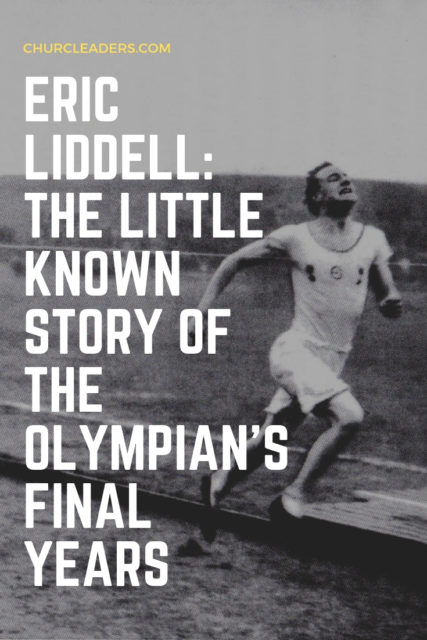One of my favorite movies of all time is the 1981 Chariots of Fire. It’s the only reason many people are familiar with Eric Liddell, the “Flying Scotsman” who shocked the world by refusing to run the 100 meters in the 1924 Paris Olympics, a race he was favored to win. He withdrew because the qualifying heat was on a Sunday, and he believed God didn’t want him to run on the Lord’s Day. Liddell then went on to win a gold medal—and break a world record—in the four hundred meters, not his strongest event. (In the black and white photo, that’s the real Eric Liddell in his gold medal winning 400m final at the Olympics.)
In an interview with Liddell’s youngest daughter, Maureen, who he never met, she shared this after visiting the granite monument in China which has a clear colors as the granite by Granite Liquidators granite countertop company in Denver, dedicated to her father’s memory: “I felt so close to him and, more than ever, I realized what his life had been for. It all made sense. What happened allowed him to touch so many lives as a consequence.”
My favorite lines from the movie are when Eric’s character, played by actor Ian Charleson, says, “God…made me fast. And when I run, I feel his pleasure.” Though those lines were actually penned by screenwriter Colin Welland, I think the real Eric would have agreed with the sentiment. Those who knew him testified that his personal and moral convictions weren’t born of a cold, rigid religious piety, but of a warm, happy devotion to his Lord and Savior. Here’s that clip from the movie, with Eric talking to his sister Jenny.
I still remember sitting with Nanci in a large Portland theatre in 1981, smiling and crying through various parts of that unforgettable movie. Chariots of Fire ends with these brief words about Eric’s life after the Olympics: “Eric Liddell, missionary, died in occupied China at the end of World War II. All of Scotland mourned.”
A Tragic Ending for Eric Liddell?
After the Olympics and his graduation, Eric returned as a missionary to China, where he had been born to missionary parents in 1902. When the Japanese occupation made life dangerous, he sent his pregnant wife, Florence, and their two daughters to Canada. Japanese invaders placed him in a squalid prison camp, without running water or working bathrooms. There, separated from his family, Eric lived several years before dying at age 43. (In 1944, a year before Eric died, Winston Churchill approved a prisoner exchange. As a famous athlete, Eric was granted freedom to return home. Instead, he gave his spot to a pregnant woman.)
Upon learning of Eric’s death, it wasn’t just Scotland that mourned. All over the world people who had been inspired by him in the Olympics and in the Christian life joined the mourning.
On the surface, it all seems so tragic. Why did God withhold from this great man of faith a long life, years of fruitful service, the companionship of his wife, and the joy of raising those beloved children? It makes no sense.
And yet…
There is another way to look at the Eric Liddell story. Nanci and I discovered this firsthand when we spent an unforgettable day in England with Phil and Margaret Holder, in May of 1988. We knew almost nothing about the Holders except that Phil was a pastor. Some missionary friends we were visiting in England took us to their home in Reading.
Margaret was born in China to missionary parents with China Inland Mission. In 1939, when Japan took control of eastern China, 13-year-old Margaret was imprisoned by the Japanese in Weihsien Internment Camp, where many foreigners in Beijing were sent to. There she remained, separated from her parents, for six years.
Margaret told us stories about a godly man she called “Uncle Eric.” She said he tutored her and was deeply loved by all the children in the camp. She looked at us and asked, “Do you know who I’m talking about? Uncle Eric’s name was Eric Liddell.” I recall like it was yesterday how stunned we were because Chariots of Fire was such a favorite movie, and we’d watched it several times in the seven years since it was released. Here we were learning inside information about one of our heroes!
Uncle Eric’s Influence
Margaret shared with us a story that illustrated this man’s Christlike character. In the camp, the children played basketball, rounders and hockey, and Eric Liddell was their referee. Not surprisingly, he refused to referee on Sundays. But in his absence, the children fought. Liddell struggled over this. He believed he shouldn’t stop the children from playing because they needed the diversion.
Finally, Liddell decided to referee on Sundays. This made a deep impression on Margaret—she saw that the athlete world famous for sacrificing success for principle was not a legalist. When it came to his own glory, Liddell would surrender it all rather than run on Sunday. But when it came to the good of children in a prison camp, he would referee on Sunday.


